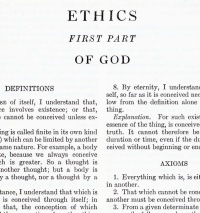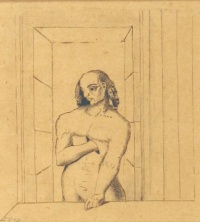Philosophy
From The Art and Popular Culture Encyclopedia
(Difference between revisions)
| Revision as of 21:15, 31 May 2012 Jahsonic (Talk | contribs) ← Previous diff |
Revision as of 21:15, 31 May 2012 Jahsonic (Talk | contribs) Next diff → |
||
| Line 24: | Line 24: | ||
| *[[Map–territory relation]] | *[[Map–territory relation]] | ||
| *[[Philosophy of language]] | *[[Philosophy of language]] | ||
| - | *[[general economy]] | + | *[[General economy]] |
| *[[Desiring-production]] | *[[Desiring-production]] | ||
| *[[Twentieth-century French philosophy]] | *[[Twentieth-century French philosophy]] | ||
Revision as of 21:15, 31 May 2012

Plato (left) and Aristotle (right), a detail of The School of Athens, a fresco by Raphael. Aristotle gestures to the earth, representing his belief in knowledge through empirical observation and experience, while holding a copy of his Nicomachean Ethics in his hand. Plato holds his Timaeus and gestures to the heavens, representing his belief in The Forms

By virtue of his magnum opus, the posthumous Ethics, Spinoza is considered one of Western philosophy's definitive ethicists.

Inversions, the first French gay journal is published. Produced between 1924 and 1926, it stopped publication after the French government charged the publishers with "Outrage aux bonnes mœurs". Its full title was Inversions ... in art, literature, philosophy and science.

The heart has its reasons, of which reason knows nothing (c.1887) by Odilon Redon, a phrase from the Pensées (1669) by Blaise Pascal
|
Related e |
|
Featured: |
- "Nothing is more usual than for philosophers to encroach on the province of grammarians, and to engage in disputes of words, while they imagine they are handling controversies of the deepest importance and concern." - David Hume
- An academic discipline that is often divided into five major branches: logic; metaphysics; epistemology; ethics; and aesthetics.
- A comprehensive system of belief.
- A view or outlook regarding fundamental principles underlying some domain.
- a philosophy of government
- a philosophy of education
- A general principle (usually moral).
Philosophy is the discipline concerned with questions of how one should live (ethics); what sorts of things exist and what are their essential natures (metaphysics); what counts as genuine knowledge (epistemology); and what are the correct principles of reasoning (logic).
See also
- Anti-philosophy
- 19th century philosophy
- 20th century philosophy
- Continental philosophy
- Map–territory relation
- Philosophy of language
- General economy
- Desiring-production
- Twentieth-century French philosophy
- Theory
- Western philosophy
- Postmodern philosophy
- Haecceity
- Process philosophy
- Philosophy and literature
- Philosophy and film
- Embodied philosophy
- Toilet philosophy
- Kant and Sade: The Ideal Couple by Zizek
- Philosophy in the Bedroom by Sade
See also
- Lists of philosophers
- List of philosophy journals
- Unsolved problems in philosophy
- Political philosophy
- Social theory
Unless indicated otherwise, the text in this article is either based on Wikipedia article "Philosophy" or another language Wikipedia page thereof used under the terms of the GNU Free Documentation License; or on research by Jahsonic and friends. See Art and Popular Culture's copyright notice.



